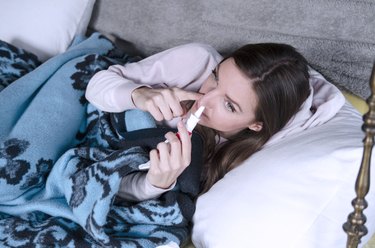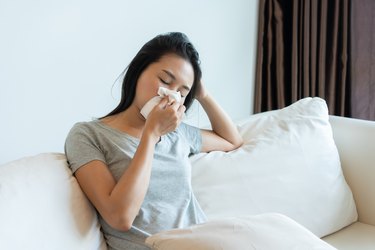
You can breathe easy through your nose all day long, but without fail, you always end up with a stuffy nose at night. What gives?
Congestion caused by a cold or allergies is unlikely to only strike when you're trying to sleep, says Michael Yong, MD, MPH, a board-certified otolaryngologist (ENT) and fellowship-trained neurorhinologist at Pacific Neuroscience Institute in Santa Monica, California.
Video of the Day
Video of the Day
Typically those problems would cause symptoms during other times of the day too.
Instead, most people who have a stuffy nose only at night have a condition called inferior turbinate hypertrophy, Dr. Yong says. Here's how to tell if you're affected and what you can do to find relief.
The Most Common Cause of Nighttime Stuffiness
Inferior turbinate hypertrophy is a benign condition that can cause congestion when you're trying to sleep. The condition occurs when your turbinates, the bony structures inside the nose, become enlarged or swollen, which can make it harder to breathe through your nostrils, according to the Mayo Clinic.
Your turbinates are lined with a soft, blood-rich tissue, and they're more likely to swell when you're lying down versus standing or sitting thanks to gravity, Dr. Yong explains. The result: A stuffy nose only at night, when you lie down in bed.
If you tend to sleep on your side, you might notice the stuffiness is worse on the side of your nose facing the pillow (because again, gravity!).
Along with the uptick in stuffiness when you get into bed, you might also experience snoring, trouble sleeping, nosebleeds, a feeling of dryness in your nasal cavities and even a reduced sense of smell, say experts at Nationwide Children's Hospital.
Sometimes larger turbinates are simply the result of "normal anatomic variation," Dr. Young says (aka, you're just born that way).
But a cold, allergies or a sinus infection can also trigger or worsen inferior turbinate hypertrophy, because these issues can cause nasal swelling on their own.
Nasal blockages like a deviated septum or nasal polyps can compound the problem too, Dr. Yong says.
How to Clear a Stuffy Nose at Night
The usual home methods you rely on to un-stuff your nose are often helpful for managing inferior turbinate hypertrophy, especially because the problem can be triggered or worsened by colds or allergies.
Dr. Yong recommends trying:
- Nasal saline rinses: A saline rinse can help reduce inflammation of your soft nasal tissues while rinsing away allergens or irritants (like dust mites or pollen) that could be making the problem worse. Dr. Yong prefers rinsing with a nasal irrigation bottle (over rinsing with a neti pot), because it sends more saline through your nasal passages. Try NeilMed SinuFlo ReadyRinse ($9.47, Amazon).
- Nasal steroid sprays: When used regularly, over-the-counter nasal steroid sprays like fluticasone (Flonase) help reduce nasal swelling and inflammation, easing congestion. "They're safe to use on a regular basis and work best when used consistently over the course of a couple of months," he says. Steer clear of nasal decongestant sprays like oxymetazoline (Afrin), though, which can actually make congestion worse when used for more than a couple of days at a time.
- Antihistamine nasal spray: If you suspect allergies are making your nighttime stuffiness worse, an over-the-counter spray like azelastine (Astepro) can help reduce allergen-related inflammation in your nasal passages. "They have fewer side effects than oral antihistamines," says Dr. Yong.
- Surgical options: If at-home measures or medications aren't doing enough to manage the problem, an ENT may suggest surgery to reduce the size of your nasal turbinates, which can help make it easier to breathe.
When to See a Doctor
Inferior turbinate hypertrophy isn't seriously harmful, but it can affect your sleep (which can in turn affect your overall health). So let your doctor know if at-home measures aren't making a difference for your nighttime congestion.
"Anytime you feel like you need more help is a good time to see your primary care doctor or an ENT," Dr. Yong says.
Touch base with your doctor, too, if you're experiencing facial pain or pressure, or abnormal nasal discharge or bleeding. These could be signs of an infection that require treatment.
Is this an emergency? If you are experiencing serious medical symptoms, please see the National Library of Medicine’s list of signs you need emergency medical attention or call 911.


